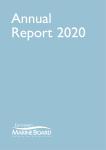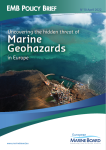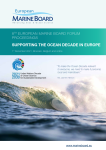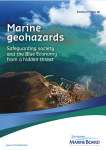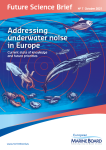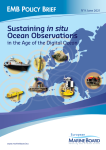As for every other organization, the year 2020 was marked by the impact from COVID-19. As formulated by our Chair Gilles Lericolais in his foreword to the Annual Report, the search for solutions out of this crisis demonstrates that research is an investment in our future and should be kept at the heart of the EU’s new Framework Programme Horizon Europe. For EMB and our Member organizations, research and innovation are at the heart of our concerns, and this pandemic has brought new or different ways of organizing research activities, collaborating, networking, organising events, and communicating research results. Find out all about our activities in the EMB Annual Report 2020.
EMB publications
Today, our society depends on critical coastal and marine infrastructure such as ports, telecommunication cables and renewable energy installations. With increasing human activities conducted in the marine environment and an increasing population living at the coast, society is becoming more exposed and vulnerable to the impacts of marine geohazards. This Policy Brief raises awareness about dormant geological risks in European coastal regions, and makes recommendations for future research and policy. It summarises the main messages and recommendations from the recent EMB Position Paper Nº26 on “Marine Geohazards: Safeguarding Society and the Blue Economy from a Hidden Threat”, published in December 2021.
The 8th EMB Forum took place in Brussels and online on 1 December 2021, and was on the topic of "Supporting the Ocean Decade in Europe". Over 100 participants from Europe and further afield engaged both online and in person, representing academia, early career researchers, policy-makers, industry, and NGOs. This document is a summary of the discussions, and full recordings of the sessions are available on the EMB YouTube Channel.
Considering that marine geohazards are unavoidable and will certainly continue to occur in the future, it is crucial to improve and expand our knowledge of those events. EMB Position Paper Nº26 presents an overview of the type, distribution and impact of marine geohazards on the European coastal regions and Blue Economy sectors. It highlights novel scientific approaches that broaden our understanding of their processes, trigger mechanisms and precursors. The document points towards relevant actions that would ensure the development of effective risk-mitigation and science-based management practices and policies, thereby contributing to protect coastal population and economic activities at sea.
EMB Future Science Brief N°7 outlines the current state of our knowledge on the sources of anthropogenic sounds and the effects of noise on marine organisms. Moreover, it provides an overview of the measures that have been taken to address the issue of underwater noise. In order to develop proportionate mitigation strategies and effective regulation, we have to advance our knowledge about the effects of anthropogenic noise on marine organisms and their ecosystems.
This Policy Brief focuses on in situ Ocean observations and highlights their benefits, funding and governance challenges, and the investment needed for their transformation and sustainability. This document is the result of an ad hoc Working Group established by the European Marine Board to address this topic, in light of the UN Decade of Ocean Science for Sustainable Development, and the start of Age of the Digital Ocean.
The 7th EMB Forum took place online on 23rd October 2020 on the topic of 'Big Data in Marine Science: Supporting the European Green Deal, the EU 2030 Biodiversity Strategy, and a Digital Twin Ocean'. 192 participants from Europe and further afield were present, representing academia, government, industry, and NGOs. Experts gave presentations and participated in panel discussions, with audience interaction. This document is a summary of the discussions, and full recordings of the sessions are available on the EMB YouTube Channel.
